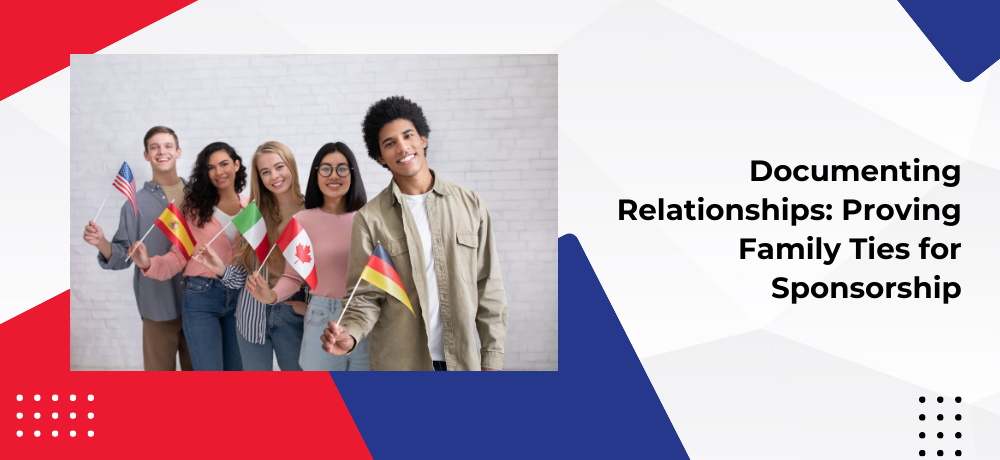Documenting Relationships: Proving Family Ties for Sponsorship

In the realm of Canadian immigration, few things are as important as family ties. They can make the difference between obtaining a visa or sponsorship approval and facing rejection. At Royal Coast Immigration Consultancy Ltd., we understand the significance of proving family relationships for sponsorship in Canadian immigration. In this comprehensive guide, we'll delve into the intricacies of documenting relationships and providing you with essential insights to navigate this process successfully.
Understanding Family Sponsorship
One of the key aspects of Canadian immigration is family sponsorship. This program allows Canadian citizens and permanent residents to sponsor their family members, enabling them to become permanent residents of Canada. This program emphasizes the importance of keeping families together and reunifying loved ones in the land of opportunities.
Eligibility Criteria
Before we dive into the nitty-gritty of documenting family relationships, it's essential to understand the eligibility criteria for sponsors and sponsored individuals:
Sponsor Eligibility
1. Canadian citizens, permanent residents, or registered Indians can sponsor their:
Spouse or common-law partner
Dependent children
Parents and grandparents
Siblings, nephews, and nieces (under specific conditions)
Sponsored Individual Eligibility
2. Sponsored individuals must meet certain criteria to be eligible for sponsorship:
Prove the relationship with the sponsor
Pass criminal and medical background checks
Sign an undertaking, committing to support themselves and their family members financially
Documenting Relationships
Now, let's delve into the heart of the matter – how to document relationships effectively for sponsorship in Canadian immigration. This step is crucial because it ensures that the relationship is genuine and not simply for immigration purposes.
1. Marriage and Common-Law Partners
If you're sponsoring your spouse or common-law partner, you'll need to provide:
Marriage certificate or proof of common-law partnership
Evidence of cohabitation
Joint financial documents
Affidavits from friends and family
Additionally, consider including a personal statement outlining the history of your relationship, how you met, and your future plans together in Canada. This can add a human touch to your application.
2. Parent and Grandparent Sponsorship
Sponsoring parents or grandparents requires proof of the familial relationship. You'll need:
Birth certificates
Marriage certificates (if applicable)
Proof of financial support
Letters of invitation
To expand on your application, include letters from family members or friends who can vouch for the authenticity of your relationship with your parents or grandparents.
3. Dependent Children
For sponsoring dependent children, you should have:
Birth certificates
Proof of custody (if applicable)
Adoption papers (if applicable)
Evidence of financial support
Share your future plans for your child in Canada. This could include educational goals, extracurricular activities, and how you intend to provide for their well-being.
4. Siblings, Nephews, and Nieces
In cases where you're sponsoring siblings, nephews, or nieces, you'll need:
Birth certificates establishing the relationship
Proof of the orphaned status (if applicable)
Evidence of financial support
To bolster your case, you can include photographs, letters, or other documentation that illustrates your close bond with your extended family members.
Why Accuracy Matters
Accurate documentation is the cornerstone of a successful sponsorship application. Any discrepancies or inconsistencies in your paperwork could lead to delays or denials. Therefore, it's essential to ensure that every document you submit is authentic and reflects your genuine relationship with the sponsored individual.
Issues to Look Out For
1. Common Challenges in Documenting Relationships
Documenting family relationships can be challenging, especially when sponsors and sponsored individuals live in different countries. It's important to address these challenges in your application. Discuss how you've overcome geographical barriers, maintained communication, and how your relationship has endured despite the distance.
2. The Role of Statutory Declarations
In some cases, statutory declarations can strengthen your case. These are legal documents signed by individuals who can attest to the authenticity of your relationship. Explore the process of obtaining and including these declarations in your application.
3. Demonstrating Genuine Intent
Immigration authorities look for evidence of genuine intent to live as a family in Canada. Explain your long-term plans, such as housing arrangements, educational goals for children, and your commitment to integrating into Canadian society.
4. Legal Assistance
Navigating the intricacies of Canadian immigration law can be overwhelming. Consider seeking legal assistance, like the services we offer at Royal Coast Immigration Consultancy Ltd., to ensure that your sponsorship application is comprehensive and error-free.
At Royal Coast Immigration Consultancy Ltd., we are dedicated to helping you navigate the complex world of Canadian immigration. We believe in keeping families together and assisting you in realizing your dreams of a new life in Canada. Our experienced team is here to provide guidance and support throughout the sponsorship process.
To learn more about what we offer, please click here. If you have questions, we'd be happy to hear from you. Feel free to call us at (604) 776-2666 or email info@royalcoastimmigration.com.